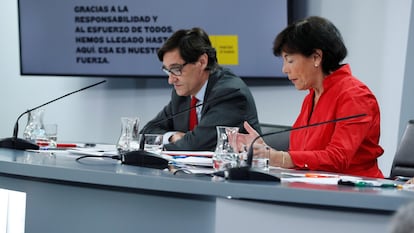The reopening of schools in Spain: Here are the measures agreed by the government and the regions
Face masks will be obligatory for children aged six and over under the protocols announced on Thursday, even when social distancing can be observed


Spain’s education minister, Isabel Celaá, and the health minister, Salvador Illa, appeared on Thursday at a press conference to announce the measures that had been agreed earlier in the day with the country’s regions regarding the reopening of schools this September, after they were closed in March due to the coronavirus pandemic. Accompanied by Territorial Policy Minister Carolina Darias, they explained the rules regarding face masks, social-distancing requirements and the ventilation of classrooms. The aim of the policies, Celaá said, is twofold: “To achieve the highest level of face-to-face teaching possible, and to manage a safe return to the classroom.” Here are the measures that were set out by the government.
- Masks will be obligatory for students aged six and over, whether or not social distancing can be respected.
- Face masks will also be mandatory on school transport from the age of six upward. Their use is also recommended for children aged three to five on such journeys. Each child will be given an assigned seat on buses.
- Physical distancing between students will be set at 1.5 meters.
- Students and teachers will have their temperature taken before each school day begins. “Should this be done at the school, the latter will have a way to do so that avoids crowds and ensures that minimum interpersonal distancing is observed,” the Health Ministry said via a press release.
- Students will wash their hands “frequently and rigorously” according to Celaá, at least five times a day. Illa mentioned a study from the San Juan de Dios hospital that highlights the importance of this safety measure to limit infections.
- Classrooms will be frequently ventilated, Illa explained, before and each class, during break times, and at the end of the day. The health chief also called for windows to be left open during the entire school day if possible.
- The cleaning of school buildings will be stepped up, particularly in bathrooms and areas that are most frequently used.
- Each school will count on a person who is responsible for ensuring that the protocols are respected and that action is taken should new cases appear.
- So-called “bubble” groups will be created in the school, which will limit the contact that students have with other classes. Children up to the age of nine will be in these groups, and will not have to respect a minimum social distance. The government has recommended that older children be kept in bubble groups as far as is possible.
- The Health and Education ministries have called for activities that involve the mixing of different groups of students to be avoided, as well as classes where the 1.5-meter social distance can’t be avoided. “Contact between classes will be minimized” as much as possible in older students, Illa said on Thursday.
- The use of open-air spaces for activities will be prioritized.
- Staff at schools will reduce their physical presence on site “to the essential minimum,” with priority for remote working wherever possible.
- The authorities have recommended communication with students’ families by phone, email, messages or post, facilitating administrative tasks by remote means.
- Any staff who are particularly vulnerable to Covid-19 will have to rigorously respect the protection measures.
- Schools will be open for the whole term, as will canteens and services for students with special needs, “provided that the epidemiological situation allows for it,” Celaá explained.
- Social distancing will also be respected in canteens, apart from for bubble groups of students. Each child will have an assigned seat in the canteen for the whole school year.
- Any sports events at schools will take place without members of the public present.
- Education professionals will be trained in the pandemic safety protocols. Students will also be educated on health issues.
- Citizens are advised to travel to schools either on foot or by bicycle, as “the mobility option that best guarantees interpersonal space,” the protocol states.
- The agreement also recommends campaigns aimed at preventing stigma or discrimination related to Covid-19.
- Class sizes will be reduced thanks to “the hiring of teachers as announced by all of the regions,” but the government has stopped short of specifying a maximum number of students.
- “The suspension of face-to-face classes by a region on a unilateral basis will only take place under exceptional circumstances, after the Health Ministry has been informed and with the prior agreement of the Inter-regional Council for the National Health Service,” the Health Ministry stated in a press release.
- A coordination and monitoring group will be created by the regional health and education departments in order to track the progress of the pandemic.
- If there are people with symptoms in a school, the steps to follow are: precautionary isolation of those with symptoms and notification of health authorities; classes will continue but with greater precautionary measures until the results of diagnostic tests are confirmed; and the quarantine of close contacts.
English version by Simon Hunter.
Tu suscripción se está usando en otro dispositivo
¿Quieres añadir otro usuario a tu suscripción?
Si continúas leyendo en este dispositivo, no se podrá leer en el otro.
FlechaTu suscripción se está usando en otro dispositivo y solo puedes acceder a EL PAÍS desde un dispositivo a la vez.
Si quieres compartir tu cuenta, cambia tu suscripción a la modalidad Premium, así podrás añadir otro usuario. Cada uno accederá con su propia cuenta de email, lo que os permitirá personalizar vuestra experiencia en EL PAÍS.
¿Tienes una suscripción de empresa? Accede aquí para contratar más cuentas.
En el caso de no saber quién está usando tu cuenta, te recomendamos cambiar tu contraseña aquí.
Si decides continuar compartiendo tu cuenta, este mensaje se mostrará en tu dispositivo y en el de la otra persona que está usando tu cuenta de forma indefinida, afectando a tu experiencia de lectura. Puedes consultar aquí los términos y condiciones de la suscripción digital.








































